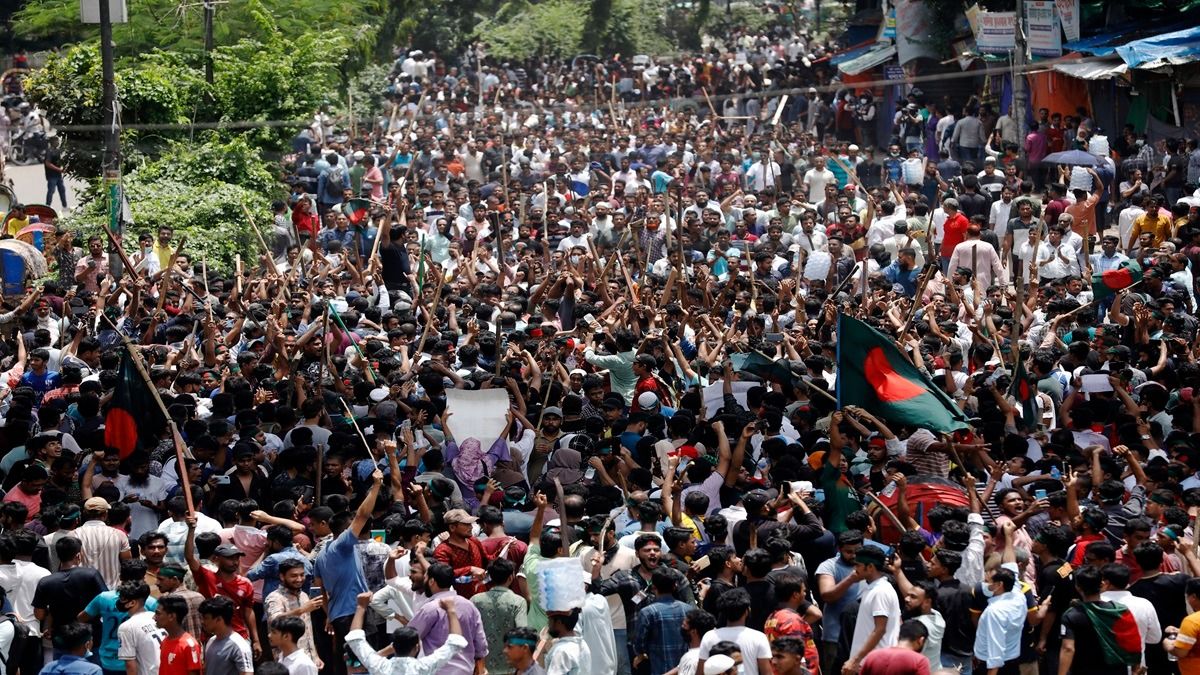Dhaka: Bangladesh is experiencing one of its most deadly days of civil unrest. What started as student-led protests against government hiring policies has escalated into severe violence, resulting in the deaths of over 260 people and triggering widespread demands for Prime Minister Sheikh Hasina’s resignation. Recent reports suggest that Hasina has been given 45 minutes for a ‘graceful exit’. Army Chief Waker-Uz-Zaman was expected to address the nation on Monday after a month of intense demonstrations. However, his address has been delayed by 45 minutes as the Army is trying to convince the PM to opt for a respectful exit by stepping down from her post.
The situation deteriorated sharply on Sunday with clashes between protesters and government supporters, leading to at least 94 deaths, including 14 police officers. The total death toll since the protests began in July has now surpassed 300.
Broadband internet and mobile data services were also cut off across Bangladesh today as anti-government protesters vowed to march to the capital to demand the prime minister’s resignation. Authorities first shut off mobile internet on Sunday in an attempt to quell the unrest, while the broadband internet stopped working from late Monday morning. This is the second internet blackout in the country after the protests turned deadly last month.
What has triggered the deadly unrest across Bangladesh?
The unrest, which erupted late last month, intensified when student activists from Dhaka University—Bangladesh’s largest—engaged in violent clashes with both police and pro-government counter-protesters. The protests originated from a controversy over a quota system that allocates up to 30 per cent of government jobs to the relatives of veterans from Bangladesh’s 1971 war of independence against Pakistan.
Protesters contend that the quota system is biased and unfairly advantages supporters of Prime Minister Hasina’s Awami League party. They are demanding a transition to a merit-based system to replace the existing quota.
‘Army Always Stood With People’
The current army chief has hinted that the military “always stands by the people,” implying possible support for the protesters. Reports indicated that the army’s actions may hinge on the stance of foreign allies, and Prime Minister Hasina might be pressured to transfer power to the military for an interim period.
The situation remains tense, with increasing pressure on Hasina to resign due to errors comparable to those of previous Pakistani leaders.
Hasina Facing Biggest Challenge
Prime Minister Sheikh Hasina, who has ruled the country for over 15 years is facing her biggest political challenge since winning a fourth term in an election boycotted by the main opposition parties in January. Hasina said the protesters who engaged in “sabotage” and destruction were no longer students but criminals, and she said the people should deal with them with iron hands. The ruling Awami League party said the demand for her resignation showed that the protests have been taken over by the main opposition Bangladesh Nationalist Party and the now-banned Jamaat-e-Islami party.
11,000 People Behind The Bars
At least 11,000 people have been arrested in recent weeks. The unrest has also resulted in the closure of schools and universities across the country, and authorities at one point imposed a shoot-on-sight curfew. Over the weekend, protesters called for a “non-cooperation” effort, urging people not to pay taxes or utility bills and not to show up for work on Sunday, a working day in Bangladesh. Offices, banks and factories opened, but commuters in Dhaka and other cities faced challenges getting to their jobs.
As the violence crested, the country’s Supreme Court ruled that the veterans’ quota must be cut to 5%, with 93% of jobs to be allocated on merit. The remaining 2% will be set aside for members of ethnic minorities and transgender and disabled people. The government accepted the decision, but protesters have continued demanding accountability for the violence they blame on the government’s use of force.
Hasina vs Opposition
Hasina’s administration has blamed the opposition parties and their student wings for instigating the violence in which several state-owned establishments were also torched or vandalized.
Mirza Fakhrul Islam Alamgir, secretary-general of the main opposition party, repeated a call for the government to step down to stop the chaos. Hasina offered to talk with student leaders on Saturday, but a coordinator refused and announced a one-point demand for her resignation. Hasina repeated her pledges to investigate the deaths and punish those responsible for the violence. She said she was ready to sit down whenever the protesters want.
Is Bangladesh On The Brink Of Military Rule? Sheikh Hasina Given 45 Mins For Graceful Exit: Reports world-news World News | Latest International Global World News | Todays Breaking News Headlines




